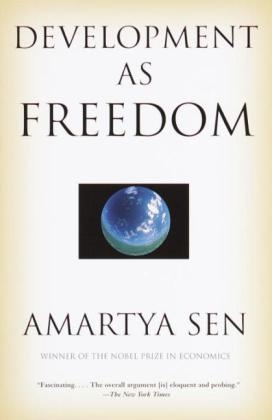Read more
Zusatztext "Fascinating. . . . The overall argument [is] eloquent and probing." -- The New York Times "A new approach . . . refreshing! thoughtful! and human. Sen's optimism and no-nonsense proposals leave one feeling that perhaps there is a solution." -- Business Week "The . . . perspective that Mr. Sen describes and advocates has great attractions. Chief among them is that! by cutting through the sterile debate for or against the market! it makes it easier to ask sharper questions about public policy." -- The Economist Informationen zum Autor Amartya Sen Klappentext By the winner of the 1988 Nobel Prize in Economics, an essential and paradigm-altering framework for understanding economic development--for both rich and poor--in the twenty-first century. Freedom, Sen argues, is both the end and most efficient means of sustaining economic life and the key to securing the general welfare of the world's entire population. Releasing the idea of individual freedom from association with any particular historical, intellectual, political, or religious tradition, Sen clearly demonstrates its current applicability and possibilities. In the new global economy, where, despite unprecedented increases in overall opulence, the contemporary world denies elementary freedoms to vast numbers--perhaps even the majority of people--he concludes, it is still possible to practically and optimistically restain a sense of social accountability. Development as Freedom is essential reading.We live in a world of unprecedented opulence of a kind that would have been hard even to imagine a century or two ago. There have also been remarkable changes beyond the economic sphere. The twentieth century has established democratic and participatory governance as the preeminent model of political organization. Concepts of human rights and political liberty are now very much a part of the prevailing rhetoric. People live much longer, on an average, than ever before. Also, the different regions of the globe are now more closely linked than they have ever been. This is so not only in the fields of trade, commerce and communication, but also in terms of interactive ideas and ideals. And yet we also live in a world with remarkable deprivation, destitution and oppression. There are many new problems as well as old ones, including persistence of poverty and unfulfilled elementary needs, occurrence of famines and widespread hunger, violation of elementary political freedoms as well as of basic liberties, extensive neglect of the interests and agency of women and worsening threats to our environment and to the sustainability of our economic and social lives. Many of these deprivations can be observed, in one form or another, in rich countries as well as poor ones. Overcoming these problems is a central part of the exercise of development. We have to recognize, it is argued here, the role of freedoms of different kinds in countering these afflictions. Indeed, individual agency is, ultimately, central to addressing these deprivations. On the other hand, the freedom of agency that we have individually is inescapably qualified and constrained by the social, political and economic opportunities that are available to us. There is a deep complementarity between individual agency and social arrangements. It is important to give simultaneous recognition to the centrality of individual freedom and to the force of social influences on the extent and reach of individual freedom. To counter the problems that we face, we have to see individual freedom as a social commitment. This is the basic approach that this work tries to explore and examine. Expansion of freedom is viewed, in this approach, both as the primary end and as the principal means of development. Development consists of the removal of various types of unfreedoms that leave people with little choice and little opportunity of...

